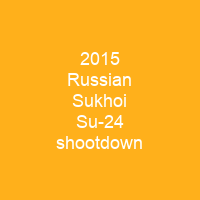A Turkish Air Force F-16 fighter jet shot down a Russian Sukhoi Su-24M attack aircraft near the Syria–Turkey border on 24 November 2015. The Russian pilot and weapon systems officer both ejected from the aircraft. The pilot was shot and killed by Syrian rebel ground fire while descending by parachute. A Russian naval infantryman from the search and rescue team launched to retrieve the two airmen was also killed when a rescue helicopter was targeted by the rebels. It was the first destruction of a Russian or Soviet Air Forces warplane by a NATO member state since an attack on the Sui-ho Dam during the Korean War in 1953.
About 2015 Russian Sukhoi Su-24 shootdown in brief
 A Turkish Air Force F-16 fighter jet shot down a Russian Sukhoi Su-24M attack aircraft near the Syria–Turkey border on 24 November 2015. According to Turkey, the aircraft was fired upon while in Turkish airspace because it violated the border up to a depth of 2. 19 kilometres for about 17 seconds. The Russia Defence Ministry denied the aircraft ever left Syrian airspace, counter-claiming that their satellite data showed that the Suk Hoi was about 1,000 metres inside Syrian airspace when it was shot down. The Russian pilot and weapon systems officer both ejected from the aircraft. The pilot was shot and killed by Syrian rebel ground fire while descending by parachute. A Russian naval infantryman from the search and rescue team launched to retrieve the two airmen was also killed when a rescue helicopter was targeted by the rebels. It was the first destruction of a Russian or Soviet Air Forces warplane by a NATO member state since an attack on the Sui-ho Dam during the Korean War in 1953. In early October, Turkey and NATO protested against what they saw as Russia’s deliberate violations of Turkish airspace. Russia deployed the guided missile cruiser Moskva armed with S-300F long-range SAM missiles off the Syrian coast near Latakia and S-400 mobile SAM systems to Khmeimim airbase. In response, the Turkish Armed Forces deployed the KORAL land-based radar electronic support system in Hatay Province along the Turkish–Syrian border. On 6 November 2015, six U. S. Air Force Air Force fighters were deployed by US European Command from the 48th Fighter Wing at their Lakenheath base in Britain to Incirlik Air Base as part of Operation Inherent Resolve.
A Turkish Air Force F-16 fighter jet shot down a Russian Sukhoi Su-24M attack aircraft near the Syria–Turkey border on 24 November 2015. According to Turkey, the aircraft was fired upon while in Turkish airspace because it violated the border up to a depth of 2. 19 kilometres for about 17 seconds. The Russia Defence Ministry denied the aircraft ever left Syrian airspace, counter-claiming that their satellite data showed that the Suk Hoi was about 1,000 metres inside Syrian airspace when it was shot down. The Russian pilot and weapon systems officer both ejected from the aircraft. The pilot was shot and killed by Syrian rebel ground fire while descending by parachute. A Russian naval infantryman from the search and rescue team launched to retrieve the two airmen was also killed when a rescue helicopter was targeted by the rebels. It was the first destruction of a Russian or Soviet Air Forces warplane by a NATO member state since an attack on the Sui-ho Dam during the Korean War in 1953. In early October, Turkey and NATO protested against what they saw as Russia’s deliberate violations of Turkish airspace. Russia deployed the guided missile cruiser Moskva armed with S-300F long-range SAM missiles off the Syrian coast near Latakia and S-400 mobile SAM systems to Khmeimim airbase. In response, the Turkish Armed Forces deployed the KORAL land-based radar electronic support system in Hatay Province along the Turkish–Syrian border. On 6 November 2015, six U. S. Air Force Air Force fighters were deployed by US European Command from the 48th Fighter Wing at their Lakenheath base in Britain to Incirlik Air Base as part of Operation Inherent Resolve.
On 19 November, Russian Ambassador to Turkey Andrei Karli Karlovov and the attaché Colonel Andrei Victorovich Dovger were summoned by Turkey for Russia’s operations near the Turkish border. Turkey warned Russia that it would be indifferent to attacks targeting the life of Turkmen in the Bayrbucak area near the Syrian border. Approximately 1,700 people had fled the area in the previous three days due to battles between Syrian government forces and al-Nusra Front fighters and Turkish-backed Syrian Turkmen. Turkey said it would start to consider all military elements approaching from Syria an enemy threat and would act accordingly. After the 2012 shooting down of a Turkish jet by Syrian forces, Turkish Prime Minister Erdoğan protested, saying that brief incursions should not trigger an attack. Nevertheless, as a response to the event he announced that Turkey changed its rules of engagement, and said it had changed its approach to the Syrian conflict. Russia has not bombed the Turkish area near Bayrbuccak in the past three days. Russia was criticised for having conducted a Russian military operation near the area, which is largely free of ISIL, and it was notified by Turkey that Turkey would react to any violations of its border of its security rules ofengagement in place in place.
You want to know more about 2015 Russian Sukhoi Su-24 shootdown?
This page is based on the article 2015 Russian Sukhoi Su-24 shootdown published in Wikipedia (as of Dec. 09, 2020) and was automatically summarized using artificial intelligence.




